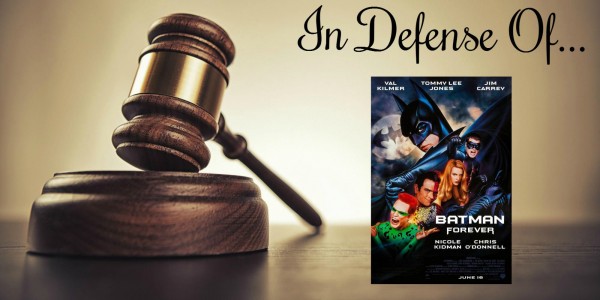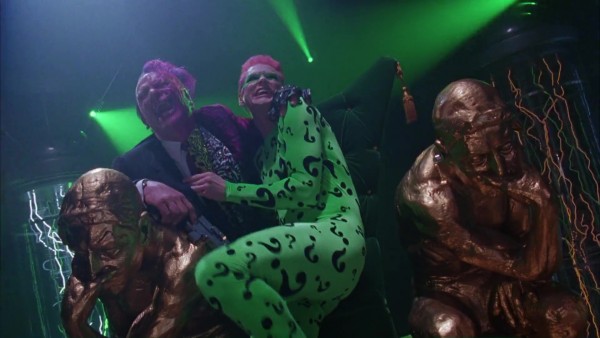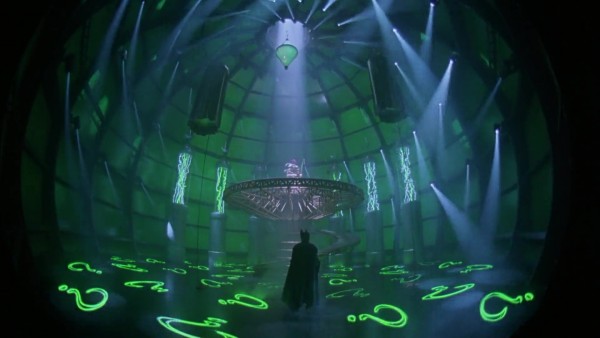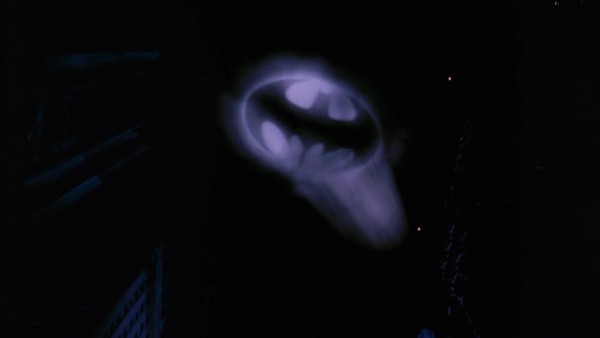In over a century of cinema, there have been far more awful films than there have been great ones. There have also been films that have been misjudged, mistreated, misrepresented or misunderstood due to any number of reasons. That’s not to say that they are unheralded classics, but we here at CHUD want to take this opportunity to highlight films that we feel deserve a retrial. Whether or not they are proven guilty or innocent will still be determined by the court of public opinion, but we believe that every film is granted the right to a defense.
The Defendant: Batman Forever (1995)
The Evidence: 2.9/5 average user rating on Rotten Tomatoes, 5.4/10 on IMDb
“[Batman Forever] was just wacky antics, new costumes, and Tommy Lee Jones doing his best Jack Nicholson impression.”
– Cliff Wheatley, Ranking the Batman Movies from IGN.com
The Defense: There is no definitive version of Batman. The character has gone through a number of drastic tonal changes throughout his seventy-six years in the popular culture. In fact, one of the most important and impacting moments for the character came in 1966 with the debut of the television show Batman. Its vibrant colors and sense of goofy fun would define the cinematic Caped Crusader for almost a quarter of a century, until Tim Burton’s big screen adaptation in 1989 (also given the simple title of Batman) reestablished the Dark Knight as… well, dark. With the overwhelming success of that film, Burton was given total reign over the sequel, Batman Returns. Although Batman Returns is the version of Burton’s Batman I prefer, the movie was unrelenting in its twisted and grim sensibilities. It was so disturbing that McDonald’s cancelled their Happy Meal tie-in toys for the film. Obviously, the Batman franchise was going to have to course-correct into something more palatable to the masses. The result was Batman Forever, a clear attempt at drawing upon the campier tone of the classic television show (the ending shot of the film is a direct reference to the opening credits of the television show, with Batman and Robin running towards the camera) and infusing it with the appropriate gaudiness of the 1990s.
It’s obvious that Batman Forever is going to divide audiences right out of the gate, thanks to the opening lines of the film being a joke about Batman getting drive-thru on his way to apprehend Two-Face. The film is admittedly overloaded with attempts at humor, but they are bolstered by inordinately over-the-top performances from both Jim Carrey and Tommy Lee Jones.
Though many people immediately criticize the two-dimensional (har har) nature of Jones’ Harvey Dent, it’s important to keep two (*sigh*) things in mind: 1) Jones is playing the character how he most likely would have been interpreted in the 1966 television show, channeling the likes of Cesar Romero’s Joker. 2) Two-Face is very clearly a sub-villain, and although Burton’s previous film demonstrated that balancing two villains was possible, it was mostly at the cost of diminishing Batman’s screen time. It is regrettable that such a fascinating and tragic figure as Two-Face had to be introduced to audiences as a backup player, but I don’t mind that when Jones’ performance is swinging for the fences. He takes the manic energy we saw in Natural Born Killers and cranks it up to eleven, and he’s helped by a fantastic combination of Rick Baker makeup effects, off-the-wall costuming, and wackadoo lines of baddie dialogue (his introductory soliloquy on the injustices of the world is delightfully fun). Jones doesn’t get enough credit for being enjoyably twisted, probably due to Jim Carrey spending a lot more time in the spotlight.
It’s no mystery that Jones and Carrey weren’t on great terms during the making of this movie, but you wouldn’t be able to tell that from their time on screen together. If anything, it’s possible that their enmity brought out the best in each other. Jim Carrey is at his peak Jim Carrey-ness, so your mileage is going to vary depending on how you feel about his unhinged and overly energetic humor. For me, I think the element of Carrey’s performance that gets washed over is his first real flirtation with playing with darkness. Although it’s filtered through the lens of buffoonery, there’s slivers of potential menace that peek out from Edward Nygma. I’m not surprised that only a year later, Carrey delved into shadier territory with The Cable Guy, an equally misunderstood film. And Edward Nygma offers up an interesting wrinkle in the villain formula: his real enemy is Bruce Wayne, who he obsesses over but feels rejected by (don’t worry, we’re gonna dig deep into this subtext) when Bruce doesn’t support his new invention. That was unique in the Batman movieverse at the time, and it creates an intriguing (if not multi-faceted) antagonist.
Regardless of where you stand with Batman Forever‘s jokier aspects (which mostly manifest through the villains), there are elements of the film that deserve some serious appreciation.
Joel Schumacher is the only Batman feature film director (not including those who worked on the 1966 feature version of the television show or Batman: Mask of the Phantasm a.k.a. the best Batman movie ever made) to lavishly embrace the outlandish comic book-iness of the Batman universe. The hyper-stylized colors and ubiquitous neon lights of Schumacher’s Gotham City give it a garishness that feels otherworldly. Street gangs wield glow sticks as melee weapons and are decked out in luminescent paint, lit by off-camera blacklights. The aesthetics and visual attitude actually feel like an MDMA-inspired blending of the Adam West show and the art deco-inspired Gotham City of Batman: The Animated Series, and Schumacher never feels ashamed of any of it. This is the Broadway musical version of Batman.
The other big contribution that Schumacher brings to his inaugural outing with Batman is the inclusion of Dick Grayson a.k.a. Robin, the Boy Wonder. This is the area where the film overwhelmingly succeeds, because Schumacher decides to make this superhero story personal by adding in a not-so-thinly-veiled ode to homosexual love. Though implying a homosexual relationship between Batman and Robin was once utilized as part of Fredric Wertham’s demonization of comic books in Seduction of the Innocent, it eventually became nothing more than an easy joke for most people. Schumacher has been an openly gay man for the majority of his career, and he’s never been afraid to make his sexuality a part of films (cult favorite The Lost Boys is a great example of this). Although Batman Forever can’t be literal with its romance between Bruce and Dick, it’s all there to pick apart. During their first exchange, Dick takes a very unsubtle jab at Bruce by asking him if he “hangs out at a lot of biker bars,” but Bruce turns this negatively themed joke into something positive: he uses Dick’s love of motorcycles to tempt him to stay at Wayne Manor (Bruce, of course, has an enormous collection of incredible motorcycles that he offers Dick to be the mechanic on, even being able to keep one as a fee). And once Dick discovers that Bruce is Batman, Dick is relentless in his desire to become Bruce’s “partner”, culminating in one of the most affirming handshakes in cinema:
Robin is even put into the same “damsel in distress” scenario as the films requisite heterosexual interest, Dr. Chase Meridian (Nicole Kidman). I haven’t mentioned her up to this point simply because she is exactly that: unfortunately necessary. Kidman is gorgeous and appropriately sultry, but her romantic entanglement as Bruce’s psychiatrist falls flat next to the more tender (this movie’s theme song is “Kiss from a Rose.” How much more tender can you get?) and well-executed romance between Bruce and his new ward.
Even Edward Nygma is given a homosexual twist to his origins. He has magazine covers featuring Bruce Wayne plastered all over his workspace and at his apartment, and he proudly says that Bruce hired him personally because Bruce’s name was on the hiring slip (which Nygma kept, of course). When Bruce refuses to sponsor Nygma’s invention, Nygma reacts like a jilted lover a la Glenn Close in Fatal Attraction.
Bruce himself seems to be struggling with his *ahem* lifestyle choice and even quits being Batman at one point, not wanting Dick to follow him down the same path. At the film’s climax, he comes to the realization that he can be both Bruce Wayne (a successful and functioning member of society) and Batman (accepting of his more wild nightlife and darker urges). Though most people would view this moral in a snarky way, I feel the whole film is a great message to gay and lesbian viewers that you can be who you are on the inside and not be forced to accept what society deems as “normal” while still being a regular and respected member of that society.
This viewpoint wasn’t completely lost on people, and even the later season of Batman: The Animated Series poked fun at Schumacher’s use of the Batman world in this video clip, which admittedly illicits a fanboyish chuckle, but also feels a little icky twenty years later:
There’s other positives in the film besides its subtext. Though his score isn’t as iconic as Elfman’s, Elliot Goldenthal drops the lyricism of the previous films and goes for outright bombast, and it really works. His new theme matches the livelier spirit of this new Batman well. Heck, even the soundtrack of this movie great! Though I skip the U2 track every time, you’ve got Seal’s immortal “Kiss from a Rose” along with The Flaming Lips, The Offspring, Massive Attack, Nick Cave and the Bad Seeds, and even Method Man! And see if you can spot a babyface Jon Favreau in the background. I didn’t notice him until this most recent watch!
Closing Argument: The biggest crimes Batman Forever committed were trying to somehow justify itself as a sequel to the Burton films and being in close proximity to the gratingly cheesy Batman & Robin, which sunk into pure toy commercial stupidity. Otherwise, it’s a good example of how versatile the character of Batman can be. The film is overtly comic book-y in its production design and sense of fun, and our culture has grown up enough to analyze the homosexual undertones of the film without giggling like middle schoolers (“tee hee, the Bat-suit has nipples!”). When people bemoan the unrelenting grimness of Zack Snyder’s upcoming take on Batman, I wonder if they’ve ever given the second best goofy Batman movie (Adam West’s 1966 outing does top this one) a real chance. I think they’d find a lot more than the film’s legacy would lead them to believe.
You Be the Judge: Batman Forever is available on DVD and Blu-ray. You can also rent it on Amazon Instant Video.
Discuss this and other In Defense Of… titles in our forums.



